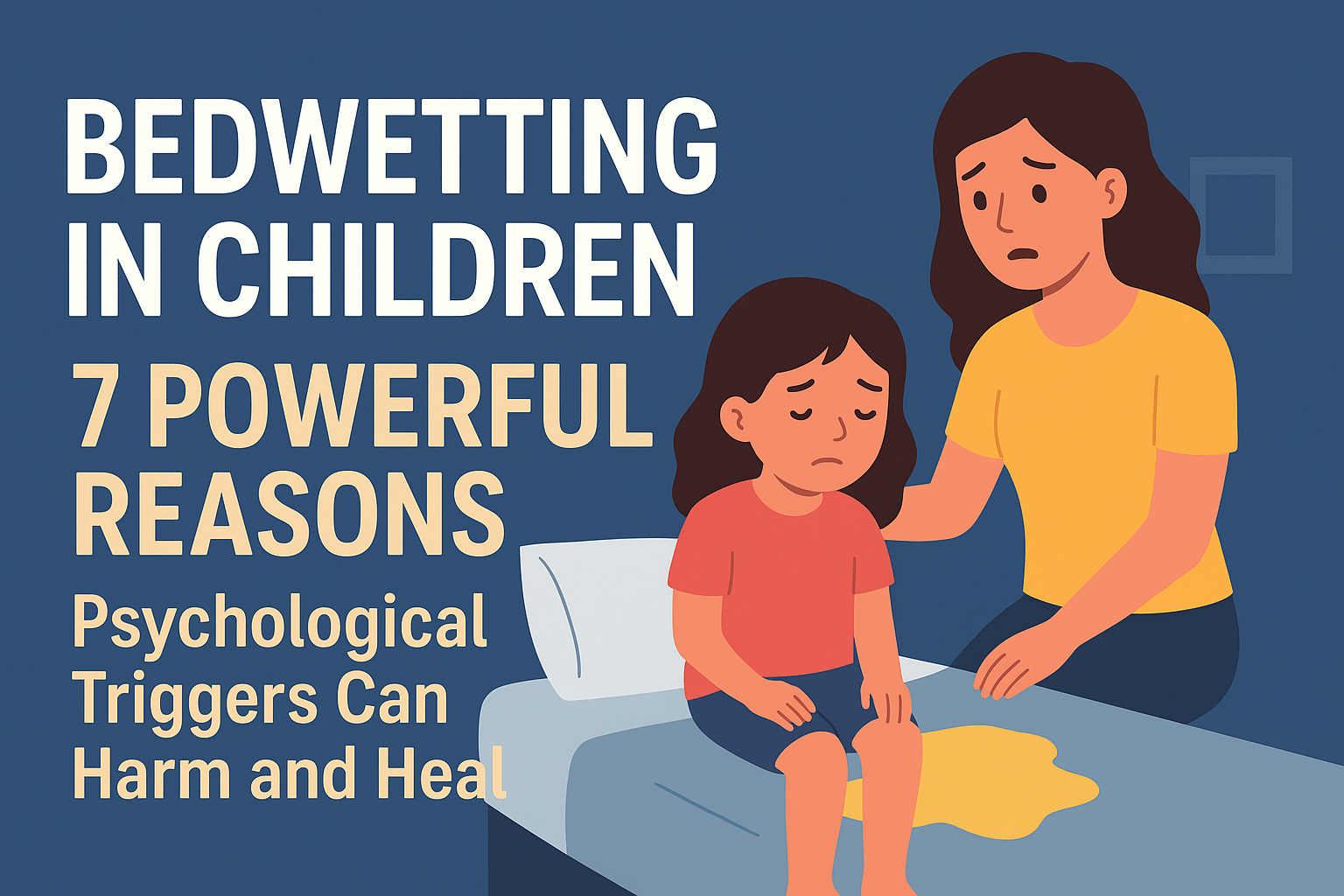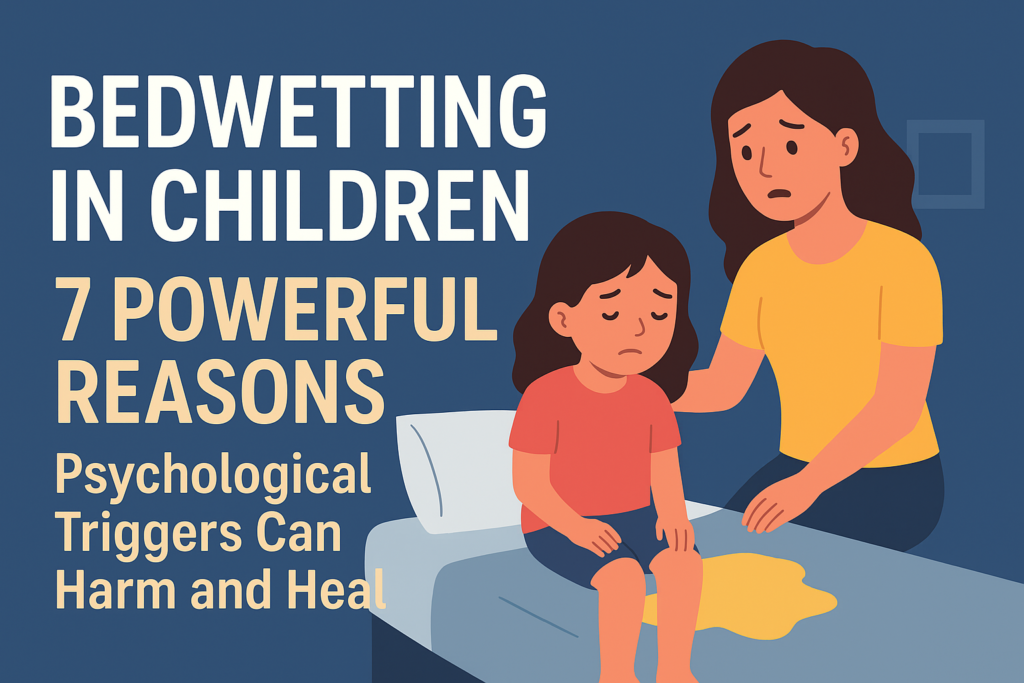
Bedwetting in Children: 7 Powerful Reasons Psychological Triggers Can Harm and Heal
Why Certain Children Do Bedwetting Due to Psychological Reasons
It is also called nocturnal enuresis, is a common concern among parents. While physical or medical causes are well-known, many overlook the fact that bedwetting in children can also stem from deep psychological reasons. Understanding the mental and emotional triggers can help parents address the issue with empathy instead of punishment.
Understanding the Psychological Side
For some children, it is not a result of a bladder problem but rather a reflection of emotional stress or unprocessed trauma. Psychological triggers can disrupt the brain-bladder communication during sleep, leading to involuntary urination at night.
Common Psychological Reasons
1. Stress and Anxiety
Children experiencing major changes—such as moving to a new school, parents separating, or losing a loved one—may develop stress-related bedwetting. Anxiety can cause restless sleep patterns and interfere with bladder control.
2. Low Self-Esteem and Emotional Insecurity
It is also be linked to feelings of inadequacy. Kids who feel undervalued or are constantly criticized may internalize emotional insecurity, which can manifest in involuntary urination during the night.
3. Family Conflicts and Unstable Home Environment
Psychological safety is essential for children. In households where frequent arguments occur or where a child feels emotionally unsafe, bedwetting can emerge as a subconscious stress response.
4. Trauma and Emotional Suppression
Children who have faced emotional neglect, verbal abuse, or other traumatic events may use bedwetting as an unspoken cry for help. The body sometimes expresses what the mind cannot verbalize.
How Psychological Factors Affect
When a child is under emotional strain, the nervous system may remain in a heightened state even during sleep. This can impair the ability of the brain to send timely signals to the bladder, increasing the risk of accidents at night.
The Role of Sleep Quality
Poor sleep caused by nightmares, anxiety, or overthinking can make it harder for children to wake up in time when their bladder is full. Stress hormones like cortisol can also disrupt normal sleep patterns, indirectly contributing to bedwetting.
Identifying If Bedwetting in Children Has Psychological Roots
Signs to Watch For
- Sudden onset of bedwetting after a long dry period
- Increased clinginess or withdrawal from social activities
- Emotional outbursts or irritability without clear cause
- Changes in appetite or sleep habits
Parents should take note of these behavioral changes and consider whether emotional stressors could be influencing their child’s nighttime bladder control.
Helping Children OBLOGvercome it
1. Create a Safe and Supportive Environment
A child who feels safe and accepted is less likely to develop anxiety-related bedwetting. Parents can focus on open communication, validating feelings, and avoiding harsh punishments.
2. Address Emotional Triggers Directly
If a child’s bedwetting began after a major life change or conflict, addressing that root cause—through honest conversations or professional counseling—can help.
3. Incorporate Relaxation Techniques
Bedtime routines that include calming activities such as storytelling, soft music, or gentle breathing exercises can lower anxiety levels, improving bladder control during sleep.
4. Avoid Shame or Punishment
Shaming a child for bedwetting can worsen the problem. Children should be reassured that the issue is not their fault and that it is treatable.
5. Consider Professional Help
If bedwetting persists despite emotional support at home, consulting a child psychologist or therapist may uncover deeper issues affecting the child’s mental and emotional well-being.
Long-Term Impact of Ignoring Psychological Bedwetting in Children
When the psychological causes of bedwetting are not addressed, children may develop lasting emotional scars, such as:
- Low confidence in social situations
- Increased anxiety or depression in adolescence
- Difficulty forming trust-based relationships
Early intervention can prevent these long-term consequences and help the child thrive both emotionally and physically.
Bedwetting in Children: Breaking the Cycle
Helping a child overcome bedwetting caused by psychological reasons involves patience, empathy, and consistency. Parents who focus on emotional healing rather than discipline can break the cycle and restore confidence in their child.
ConcluGOOGLE REVIEWSsion
In children it is not always a medical issue—sometimes, it’s a window into a child’s emotional state. Recognizing the psychological reasons behind this condition is the first step toward effective support. By creating a safe environment, addressing stressors, and seeking professional help when needed, parents can help their child not only stop bedwetting but also build resilience, self-esteem, and emotional stability

